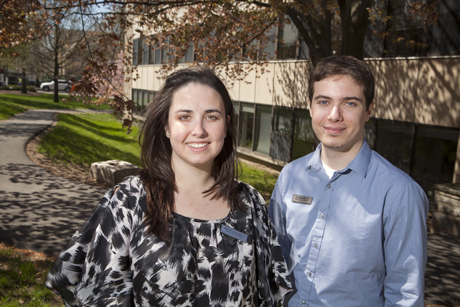Public Health Fellows reach students in need
By Diane Lebo Wallace

At 24, Joe Bergen ’11 is a “near-peer.” The undergraduate students he educates often are surprised to find that he is not much older than they. His youth, knowledge and training enable him to quickly establish a rapport with his student clients and earn their trust.
Bergen is Cornell’s first Kahn-Millman Public Health Fellow, based at Gannett Health Services. Along with another public health fellow, Angela Falisi ’12, Bergen spends half his time in one-on-one educational sessions with students referred to him for high-risk drinking. During the other half, he develops and delivers a range of mental health outreach programs.
Bergen came into his position with leadership experience gained as a Cornell resident adviser, and he understands well the multiple stresses Cornell undergraduates experience.
“There's a lot going on for 18- to 22-year-old young adults,” Bergen says. “You are trying to figure out what you’re going to do for the rest of your life and who you’re going to be. Your relationships with your friends from home, your parents and your professors are changing. Coupled with these stresses, there may also be mental health issues that are just starting to manifest themselves.”
He explains that having recently navigated some of these experiences himself helps students feel less intimidated and more willing to discuss life issues. Talking with him, he says, can be the first step in building healthy habits and eliminating high-risk behaviors.
“Near-peer fellows are on the front line of Cornell’s efforts to address high-risk drinking,” says Tim Marchell, director of mental health initiatives for Gannett Health Services. “They deliver BASICS (Brief Alcohol Screening and Intervention for College Students), a program with a 10-year record of effectiveness. Studies show that students who go through BASICS often show a significant reduction in their alcohol consumption and alcohol-related problems.
“In addition to BASICS, our fellows are working with fraternities and sororities to establish wellness chairs in chapters. Fellows also deliver outreach programs like Friend2Friend, which trains students to identify and respond to peers struggling with mental health problems or alcohol or other drug issues.”
The fellowships advance the professional development of graduates. Last year’s fellow, Laura Santacrose ’11, is pursuing a master’s degree in public health at the University at Albany School of Public Health, where she holds her program’s top fellowship. Bergen has won admission to several medical schools.
Gannett piloted the effort last year, and this year expanded the program with the addition of a second fellow, as a result of gifts from Mary Kahn ’79 and Mary Zitwer-Millman ’78. Marchell said that expanding the fellowship program will require additional funding.
“As an alumna and parent of a recent graduate, I saw a great need for addressing issues within the Cornell student body, such as alcohol abuse, anxiety, depression and eating disorders,” says Kahn.
“Our goal is to continue this program for years to come,” says Zitwer-Millman. “We hope students will avail themselves of the services during times of need, knowing that alumni and the community at large care about helping, reaching out and making a difference.”
Santacrose underscores these benefits: “Public health fellowships are good for Cornell because new energy allows for new approaches. These fellowships also increase the capacity for the health promotion department to reach more students and support more programs, which ultimately leads to better health and well-being for the students.”
Diane Lebo Wallace is a writer for Alumni Affairs and Development.
Media Contact
Get Cornell news delivered right to your inbox.
Subscribe